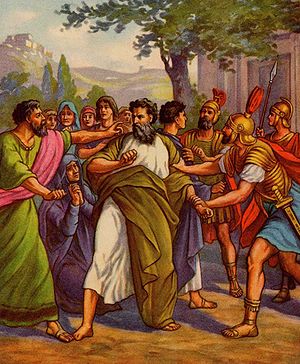 Image via WikipediaMan must.
Image via WikipediaMan must.The Second Commandment is found in the Old Testament book of Leviticus, in Chapter 19, verse 18. It is that man must:
This second commandment has many applications. However, we are going to continue our study of the human personality and so we will limit our discussion to that area. Since sin has affected ALL of the parts of the human personality, our personality must be restored through our love for God in Jesus Christ. Since we have this need ourselves, we must then apply the second commandment and say that we must also be concerned about the , and of our neighbors.
This is especially true in our efforts to lead people to a personal faith in Jesus Christ as their Savior. Our presentation of the Gospel to others should be addressed to the Whole Person. Challenge the mind with the truth of the gospel, stir their emotions, and to move their will to give themselves to Christ and save (balance) their soul.
An evangelistic/counseling ministry should focus upon three things:
We must teach clearly the meaning of the gospel message and what it means to follow Christ as His disciple. We should try to persuade people's minds with convincing arguments for the truth. Intellect.
We should tell about Jesus' love for us with great feeling. People must feel the sacrifice and love of Christ for them in their own hearts so that they might be moved by the love of God to accept Christ. Emotions
We must call with authority for a firm decision to follow Jesus Christ and obey His commandments regardless of the results. Will.
What takes place when a person fails to respond to Jesus Christ with ALL if their personality? Their conversion/salvation to Jesus will be:
What kind of decision for Christ do we really want?
The objective of all evangelism/counseling is to win the Total Man or Woman to Jesus Christ. We cannot settle for less than this. When someone comes to Him for forgiveness, they must come with the mind, the heart, and the will. In the spaces provided below, use your own words to describe how an evangelistic/counseling message may be aimed at each part of the human personality.
Intellect:
Emotions:
Will:
How does Jesus describe the personality that is totally consecrated to God? It is one who loves God
When God Touches People Today
This second commandment has many applications. However, we are going to continue our study of the human personality and so we will limit our discussion to that area. Since sin has affected ALL of the parts of the human personality, our personality must be restored through our love for God in Jesus Christ. Since we have this need ourselves, we must then apply the second commandment and say that we must also be concerned about the , and of our neighbors.
This is especially true in our efforts to lead people to a personal faith in Jesus Christ as their Savior. Our presentation of the Gospel to others should be addressed to the Whole Person. Challenge the mind with the truth of the gospel, stir their emotions, and to move their will to give themselves to Christ and save (balance) their soul.
An evangelistic/counseling ministry should focus upon three things:
We must teach clearly the meaning of the gospel message and what it means to follow Christ as His disciple. We should try to persuade people's minds with convincing arguments for the truth. Intellect.
We should tell about Jesus' love for us with great feeling. People must feel the sacrifice and love of Christ for them in their own hearts so that they might be moved by the love of God to accept Christ. Emotions
We must call with authority for a firm decision to follow Jesus Christ and obey His commandments regardless of the results. Will.
What takes place when a person fails to respond to Jesus Christ with ALL if their personality? Their conversion/salvation to Jesus will be:
What kind of decision for Christ do we really want?
The objective of all evangelism/counseling is to win the Total Man or Woman to Jesus Christ. We cannot settle for less than this. When someone comes to Him for forgiveness, they must come with the mind, the heart, and the will. In the spaces provided below, use your own words to describe how an evangelistic/counseling message may be aimed at each part of the human personality.
Intellect:
Emotions:
Will:
How does Jesus describe the personality that is totally consecrated to God? It is one who loves God
When God Touches People Today














































